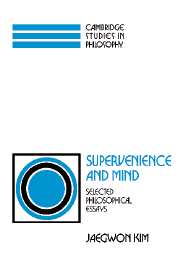Book contents
- Frontmatter
- Contents
- Preface
- Sources
- Part I Events and supervenience
- Part II Mind and mental causation
- 10 Psychophysical supervenience
- 11 Psychophysical laws
- 12 What is “naturalized epistemology”?
- 13 Mechanism, purpose, and explanatory exclusion
- 14 The myth of nonreductive materialism
- 15 Dretske on how reasons explain behavior
- 16 Multiple realization and the metaphysics of reduction
- 17 The nonreductivist's troubles with mental causation
- 18 Postscripts on mental causation
- Index
12 - What is “naturalized epistemology”?
Published online by Cambridge University Press: 28 January 2010
- Frontmatter
- Contents
- Preface
- Sources
- Part I Events and supervenience
- Part II Mind and mental causation
- 10 Psychophysical supervenience
- 11 Psychophysical laws
- 12 What is “naturalized epistemology”?
- 13 Mechanism, purpose, and explanatory exclusion
- 14 The myth of nonreductive materialism
- 15 Dretske on how reasons explain behavior
- 16 Multiple realization and the metaphysics of reduction
- 17 The nonreductivist's troubles with mental causation
- 18 Postscripts on mental causation
- Index
Summary
EPISTEMOLOGY AS A NORMATIVE INQUIRY
Descartes' epistemological inquiry in the Meditations begins with this question: What propositions are worthy of belief? In the First Meditation Descartes canvasses beliefs of various kinds he had formerly held as true and finds himself forced to conclude that he ought to reject them, that he ought not to accept them as true. We can view Cartesian epistemology as consisting of the following two projects: to identify the criteria by which we ought to regulate acceptance and rejection of beliefs, and to determine what we may be said to know according to those criteria. Descartes' epistemological agenda has been the agenda of Western epistemology to this day. The twin problems of identifying the criteria of justified belief and coming to terms with the skeptical challenge to the possibility of knowledge have defined the central tasks of theory of knowledge since Descartes. This was as true of the empiricists, of Locke and Hume and Mill, as of those who more closely followed Descartes in the rationalist path.
It is no wonder then that modern epistemology has been dominated by a single concept, that of justification, and two fundamental questions involving it: What conditions must a belief meet if we are justified in accepting it as true? and What beliefs are we in fact justified in accepting? Note that the first question does not ask for an “ analysis” or “ meaning” of the term “ justified belief”.
- Type
- Chapter
- Information
- Supervenience and MindSelected Philosophical Essays, pp. 216 - 236Publisher: Cambridge University PressPrint publication year: 1993
- 6
- Cited by



